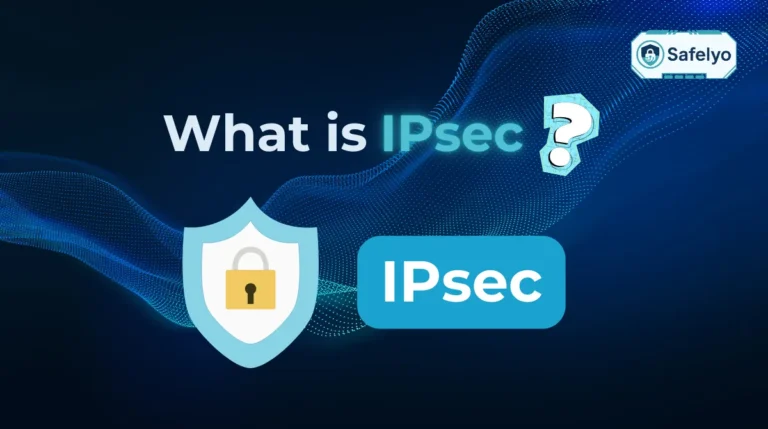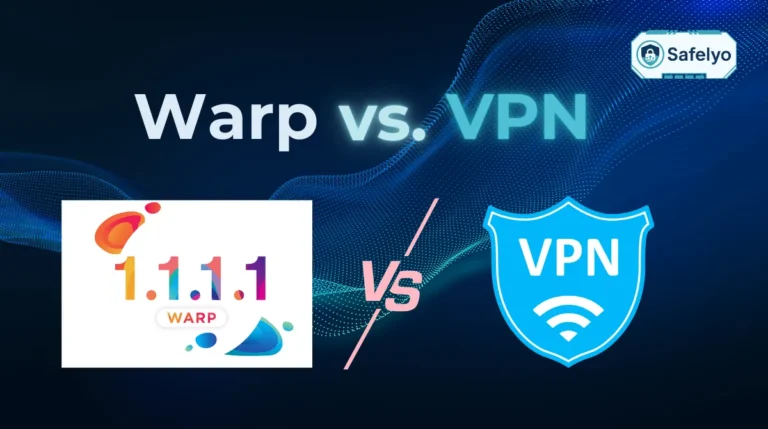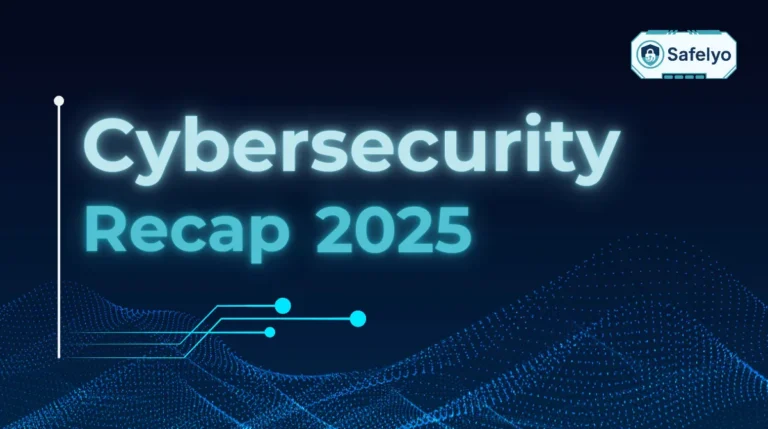So, can my ISP see my browsing history? The short, and frankly unsettling, answer is yes. Your Internet Service Provider (ISP) has a front-row seat to a significant portion of your online life, acting as the gateway for every piece of data that enters or leaves your devices.
Every website you visit, video you stream, and search you make creates a digital trail. This isn’t just a hypothetical privacy risk; in many countries, ISPs are legally allowed, and sometimes even required, to log this very data. As someone who has spent over a decade in the cybersecurity field, I’ve seen firsthand how this “metadata” can be used for everything from throttling your connection speed to building detailed profiles for advertisers.
But you are not powerless. The feeling that you’re being watched is exactly why tools for digital privacy were created. They aren’t just for tech gurus; they’re for everyone who believes their online activity should be their business alone.
In this straightforward guide, I will show you:
- Exactly what your ISP can (and can’t) see.
- The common “privacy myths” that offer you false security.
- A clear comparison of the tools that actually work to hide your activity.
- How to choose the right method to reclaim your digital freedom.
Don’t just accept being watched as the price of admission to the internet. Let’s walk through the simple, effective steps to take back control!
THE SHORT ANSWER:
Can my ISP see my browsing history?
YES
And here's what to do:
- Can they see my browsing? Yes. Your ISP sees the websites you visit, when you visit them, and for how long.
- Does Incognito help? No. It only hides history on your device, not from your ISP.
- How do I stop them? The most effective way for most people is to use a reputable VPN. It encrypts your traffic and hides your activity.
1. What exactly can my ISP see?
Let’s cut through the noise. When you connect to the internet, your ISP acts as a digital post office. They don’t necessarily read every letter, but they see every single envelope, where it’s from, where it’s going, and how big it is. This “envelope data,” more accurately called metadata, paints a surprisingly detailed picture of you.
To make it crystal clear, here’s a quick summary:
Visible to Your ISP
- Which websites do you visit (e.g., youtube.com, facebook.com)
- When you visit, and for how long
- How much data do you download or upload
- Your real IP address and general location
- The list of domains your device looks up (DNS requests)
Hidden from Your ISP
- The specific video you watch or the profile you view
- Your specific search terms on a secure site (like Google)
- Usernames, passwords, and credit card details
- The content of your emails or messages on secure platforms
- The specific files you download (just the size and source are visible)
Now, let’s dive into the details of what this means for you.
1.1. What they see: The metadata trail
This is the information your ISP logs about your connection, even if the website you’re visiting is secure.
- The websites you visit (domain names): Even with a secure HTTPS connection (that little padlock), your ISP knows you connected to www.example.com. They don’t see which specific page you read, but they know you were there.
- Timestamps and duration: They can log the exact time you connect to a site and for how long. A five-minute visit to a news site looks very different from an eight-hour Netflix binge in their records.
- The amount of data you use: They see the volume of data moving back and forth. This is how they identify heavy data users for things like bandwidth throttling (slowing you down).
- Your real IP address and general location: Your IP address is your unique identifier online, tying all of your activity directly back to your account and household.
- Your DNS requests: Unless you take specific steps to encrypt them, your ISP sees every time your computer asks, “What’s the IP address for google.com?” It’s a direct log of almost every site you intend to visit.
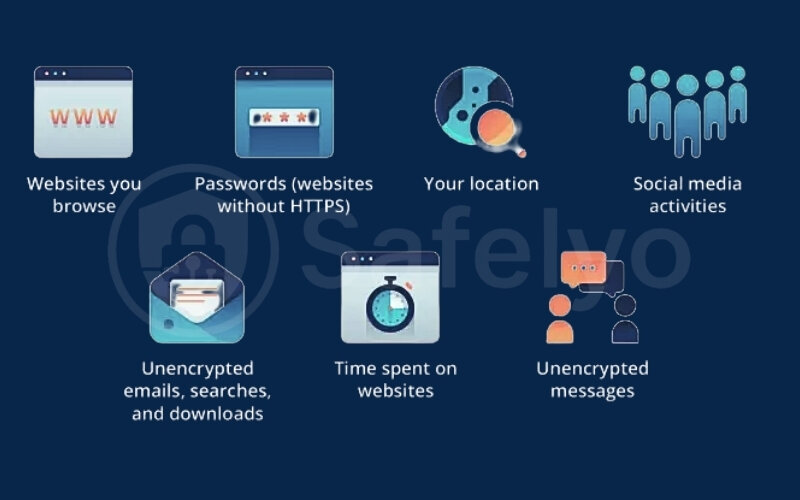
1.2. What they generally can’t see (thanks to HTTPS)
Thanks to the widespread adoption of HTTPS (the padlock icon in your browser’s address bar), the actual content of your traffic is encrypted and hidden from your ISP. This includes:
- Specific content on a page: They know you’re on YouTube, but they can’t see the specific video you’re watching. They know you’re on a medical website, but not the specific condition you’re researching.
- Your sensitive information: Usernames, passwords, and credit card numbers entered on a secure website are scrambled and unreadable to them.
- The content of your communications: The actual words in your emails on a secure service like Gmail or your private messages in apps like Signal or WhatsApp are hidden from view.
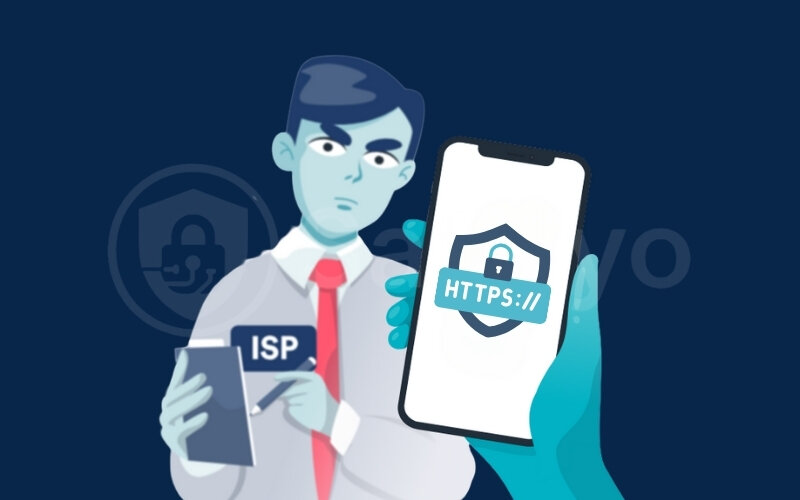
Think of it like a postcard versus a sealed, opaque letter. With a secure connection (HTTPS), your internet traffic is like that sealed letter. Your ISP can see the address on the envelope (the website domain) and that you sent it, but they cannot read the private contents inside. The problem is, even if they can’t read your letters, just seeing a daily flood of envelopes from financial advisors, health clinics, and job-seeking sites can tell someone an awful lot about you.
>> You may also be interested in: What is DNS over HTTPS (DoH) and DoT: Which is better for privacy?
2. The real-world risks of ISP tracking
Okay, so they see some domain names. What’s the big deal? It’s easy to dismiss this as harmless data collection, but the consequences of this surveillance are very real. I’ve spent years in this industry, and I can tell you that your browsing history is far more than just a list of sites; it’s a story about your life, your interests, your problems, and your plans.
Here’s how that story can be used in ways you never intended.
Your profile is for sale.
Your ISP can package your “anonymized” browsing data, your interests in “getting out of debt,” “symptoms of anxiety,” or “best divorce lawyers”, and sell it to data brokers. These companies then de-anonymize and combine this information with other data points to build a shockingly detailed profile of you, which is then sold to advertisers, insurance companies, or financial institutions.
You can be unfairly judged.
Your internet history can be misinterpreted and taken out of context. Imagine you’re a writer researching for a crime novel, or you’re simply curious about a controversial topic. In a legal dispute or a workplace investigation, that history could be requested and used to paint a misleading and damaging picture of you.
Your fun gets throttled.
This is one of the most common and frustrating risks. Because your ISP sees you connecting to Netflix, YouTube, or gaming servers for hours, they can practice bandwidth throttling. They intentionally slow down your connection during peak hours to manage their network, leaving your 4K movie buffering and your online game lagging, simply because they know what you’re doing.
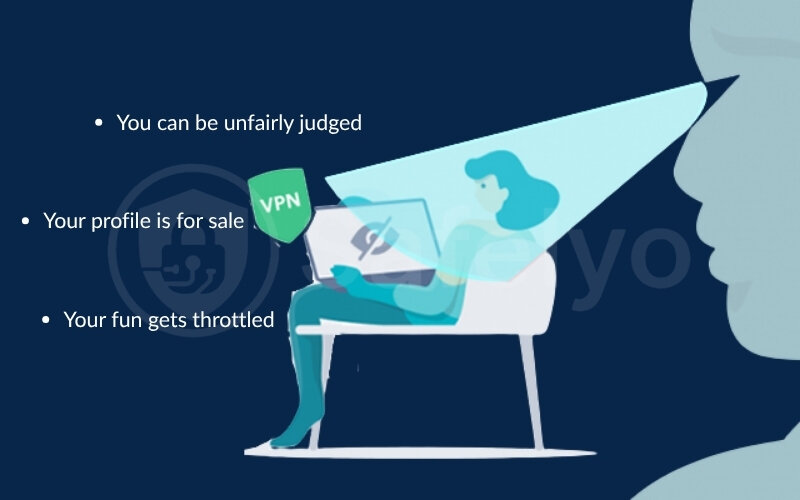
These aren’t just theoretical scare tactics – they are the tangible outcomes of a system where your data is a commodity. Understanding these personal risks is the first step to realizing why taking back your privacy is so important.
3. Why does my ISP track my browsing?
While it’s easy to assume the worst, your ISP’s tracking isn’t always driven by malicious intent. Their motivations are a mix of business strategy, legal requirements, and simple network logistics. Understanding why they do it is crucial to understanding how to protect yourself.
To make money.
This is the biggest driver. Your browsing habits are a valuable commodity. ISPs can package and sell this “anonymized” data to marketing firms and data brokers. These companies want to know what you’re interested in, what problems you’re trying to solve, and what you’re planning to buy. Selling user data is a significant revenue stream for many providers.
Legal and government requirements.
In many countries, including the US, UK, and Australia, ISPs are subject to data retention laws. These laws legally obligate them to log and store user activity data for a specific period (often from 6 months to 2 years). The stated purpose is to make this data available to law enforcement agencies upon legal request. They aren’t just choosing to do this – they’re often required to.
Bandwidth throttling.
As mentioned earlier, ISPs constantly monitor data usage across their network. If they see you’re using a lot of data, say, by streaming 4K video or downloading large files, they might intentionally slow down your connection. This practice, known as bandwidth throttling, helps them manage network traffic and reduce congestion, but it comes at the expense of your speed.
Network management and security.
On a more practical level, monitoring helps ISPs maintain their network. They look for patterns that could indicate spam, malware distribution, or other security threats. This is a legitimate and necessary part of running a large network, but it still involves monitoring your connection.
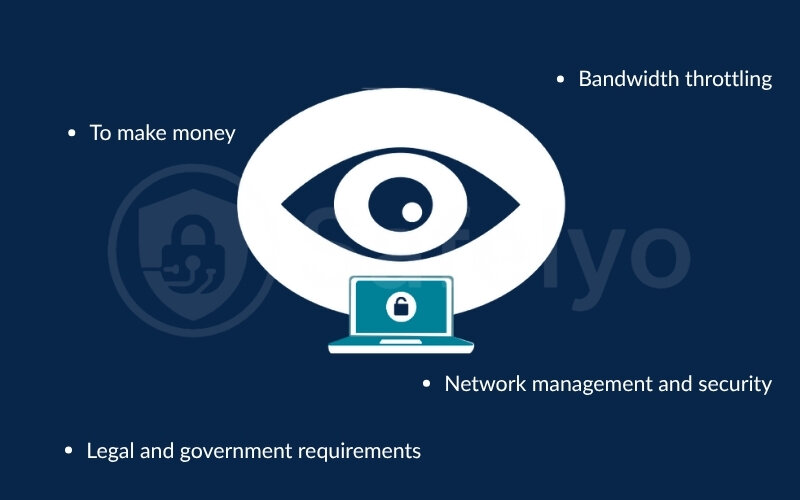
So, while some reasons are practical, the fact remains: your online life is being recorded, stored, and often monetized. This brings us to a critical point: The common methods people think are keeping them private often don’t work at all.
4. Common myths debunked: What doesn’t hide your browsing from your ISP
In the quest for privacy, it’s easy to reach for the most convenient tools built right into our browsers. However, many of these features provide a false sense of security. As someone who constantly answers questions about digital privacy, I find these are the biggest misconceptions that leave people exposed.
Let’s clear the air on what doesn’t work.
4.1. Incognito mode / Private browsing
This is the most common myth. So, can my ISP see my browsing in Incognito mode? Yes, absolutely.
Incognito or Private Browsing mode has only one job: TO stop your browser from saving your activity on your local device. When you close an incognito window, it deletes your search history, cookies, and site data from your computer or phone.
Think of it as tidying up your room after a guest leaves. The guest is gone, and there’s no trace of them in the room. But your landlord (the ISP) saw them come in and out of the building. Incognito mode offers zero protection from your ISP’s view.
>> Check out is incognito mode private, and learn how to use vpn in incognito here.
4.2. Deleting your browser history
This works on the same principle as Incognito mode, just done manually. Deleting your browser history is a local action. You are simply erasing the records stored on your own machine.
The problem is that your ISP’s logs aren’t on your machine. They are created and stored on their servers in real-time as your traffic passes through them. You have no ability to access or delete those records. Deleting your history has no effect on the data your ISP has already logged.
4.3. Using a different browser (like DuckDuckGo or Brave)
Privacy-focused browsers are fantastic tools, but it’s vital to understand what they do and don’t do. Browsers like DuckDuckGo and Brave are excellent at blocking third-party trackers on websites. They stop advertisers and data companies from following you from site to site.
However, they are still just browsers. They have to send your internet traffic through your ISP to reach a website. Your ISP still serves as the gateway and can see the domains you are connecting to. While these browsers protect you from surveillance on the web page, they do not hide your core browsing activity from your ISP.
Now that we’ve debunked what doesn’t work, let’s focus on what does.
5. How to actually stop ISP tracking?
Now that we know what doesn’t work, it’s time to explore the tools that do. There isn’t a single “perfect” solution for everyone – the best choice depends on your specific needs for security, speed, and convenience. As a security analyst, I always recommend that users understand their options before committing.
Here is a quick comparison of the most effective methods to hide your browsing activity from your ISP.
| Method | ISP Privacy | Speed | Ease of Use | Typical Cost | Best For |
|---|---|---|---|---|---|
| VPN | Excellent (Hides activity & IP) |
Fast to Very Fast | Very Easy | Paid | Every day, privacy, streaming, and general security. |
| Tor Browser | Maximum (Multi-layer encryption) |
Very Slow | Easy | Free | Anonymity where speed isn’t a concern. |
| Encrypted DNS | Partial (Hides DNS queries only) |
Fast (No noticeable impact) |
Easy | Free | A basic, first-step layer of privacy. |
| Proxy Server | Poor to Fair (Often unencrypted) |
Slow to Moderate | Moderate | Free or Paid | Generally not recommended over a VPN. |
Let’s break down how each of these works.
5.1. The best solution for most people: A VPN (virtual private network)
A VPN works by creating a secure, encrypted tunnel between your device and a server operated by the VPN provider. All your internet traffic is routed through this protective VPN tunnel, effectively scrambling it. This means your ISP can only see that you’re connected to a single IP address, the VPN server, but the websites you visit, the data you download, and your specific online actions remain completely hidden from them. As a bonus, it also hides your real IP address from the websites you visit.
So, can my ISP see my browsing with a VPN? The answer is no. They see the VPN connection, but nothing inside it.
Pros
- High-level security & strong encryption
- Excellent speeds for streaming & gaming
- Very easy to use (often one-click connect)
- Hides your IP address from sites & services
Cons
- Requires trust in the VPN provider
- The best, most secure services are paid
5.2. For maximum anonymity: The Tor Browser
Tor (The Onion Router) is a free, open-source network built for maximum anonymity. It works by routing your traffic through a volunteer-operated network of at least three random servers, called “relays.” Your data is wrapped in multiple layers of encryption, like the layers of an onion. Because each relay only knows the server that came before it and the one that comes next, it becomes extremely difficult for anyone to trace your activity back to you.
Pros
- The highest level of anonymity
- Completely free to use
Cons
- Extremely slow and often frustrating
- Not practical for daily use/streaming
- Blocked by some websites
5.3. A basic layer of privacy: Encrypted DNS
This is a simple but limited solution that tackles one specific weak point. It works by encrypting your DNS queries the moment your computer asks for a website’s IP address. By using a free service like Cloudflare (1.1.1.1), you can prevent your ISP from seeing the list of domains you are trying to visit.
However, and this is a major limitation, it does NOT hide your IP address or encrypt your actual traffic. Your ISP can still see the IP address of the website you ultimately connect to.
Pros
- Very easy to set up
- Free
- Can speed up browsing slightly
Cons
- Does not hide your IP address
- Does not encrypt your main traffic
- An incomplete privacy solution
5.4. The outdated option: Proxy servers
Proxy servers were once a popular way to bypass simple content blocks, but they have been largely surpassed by modern VPNs. A proxy works by acting as a single intermediary server. You send your request to the proxy, and the proxy forwards it to the website for you, which can hide your IP address from the destination site. However, the connection between you and the proxy is often unencrypted.
Pros
- Can hide your IP from the website
Cons
- Connection is often unencrypted
- Slow, unreliable, and unstable
- Free proxies may log and sell your data
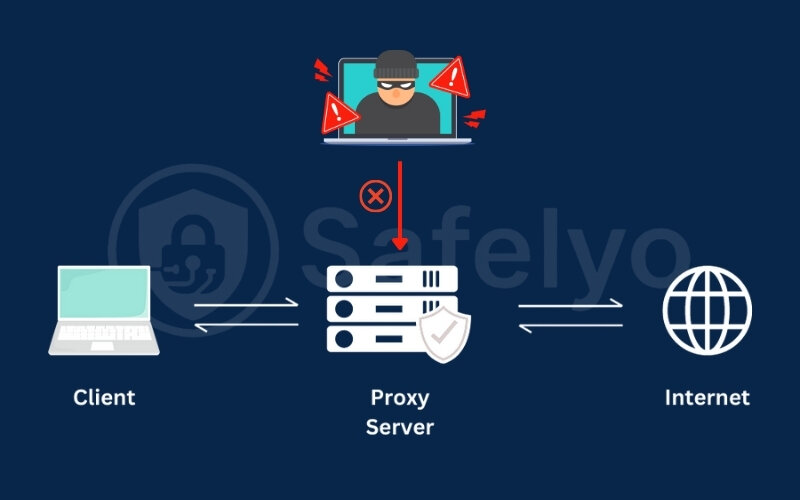
6. The verdict: Why a VPN is your best bet?
After comparing the options, a clear picture emerges. While Tor offers unparalleled anonymity and Encrypted DNS provides a basic, free improvement, a high-quality VPN stands out by delivering the optimal balance of strong security, fast speeds, and user-friendliness. For the vast majority of people looking to effectively and reliably hide their browsing history from their ISP, a VPN is the superior choice.
It’s powerful enough to completely shield your activity, yet simple enough for anyone to use with a single click. From securing your connection on public Wi-Fi to bypassing frustrating bandwidth throttling, a VPN is a versatile tool for everyday digital life.
>> Find out: Proxy vs VPN: What’s best for your online privacy?
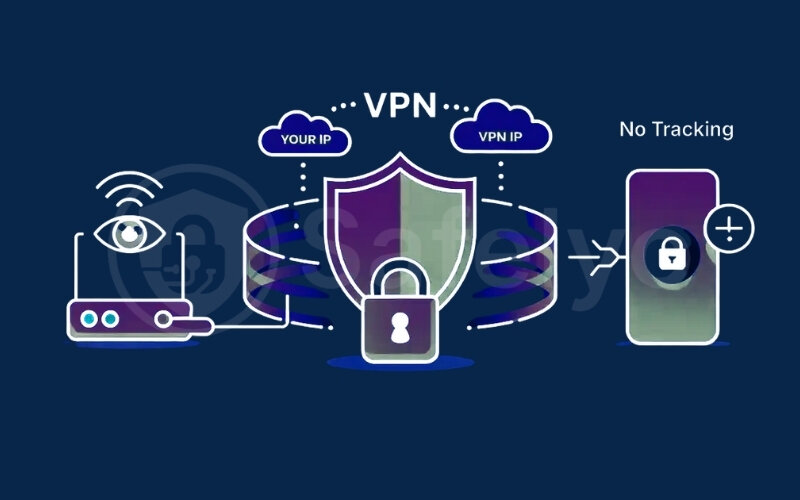
However, the key is to choose a provider you can trust. Your privacy is only as strong as the VPN you’re using. As a security expert, I can’t stress this enough: Not all VPNs are created equal. To help you make an informed choice, use this simple checklist when evaluating any VPN service.
| Check | Essential VPN Feature | Why It’s Non-Negotiable |
| 🗹 | A Strict No-Logs Policy | Ensures the VPN provider isn’t just creating a new record of your activity. |
| 🗹 | Strong Encryption (AES-256) | Provides military-grade security that makes your data unreadable to your ISP or anyone else. |
| 🗹 | An Automatic Kill Switch | Acts as a safety net, preventing data leaks if your VPN connection ever drops unexpectedly. |
| 🗹 | Privacy-Friendly Jurisdiction | The provider is based outside the reach of surveillance alliances and data retention laws. |
7. FAQ around whether my ISP can see my browsing
We’ve covered the core concepts, but you might still have some specific questions buzzing in your head. Let’s tackle them head-on with clear, straightforward answers.
Does my ISP look at my browsing history?
Yes, but typically this is done by automated systems, not a person reading your history. These systems track metadata (sites visited, time spent) for advertising, network management (like throttling), and to comply with legal data retention requirements.
How long does my ISP keep my browsing history?
This varies significantly by country due to different data retention laws. In the US, there’s no federal mandate, but most ISPs keep logs for at least 90 days to a year for business purposes. In the European Union, this period can range from 6 to 24 months.
How can I hide my browsing history from my internet service provider?
The most effective method for most people is to use a reputable VPN. It encrypts your entire connection, making your online activity unreadable to your ISP. For maximum anonymity, the Tor Browser is an option, though it is significantly slower.
Can my ISP see what I download when using a VPN?
No. With an active VPN, your ISP can only see that encrypted data is being transferred between your device and the VPN server. They cannot see the content of the data, what the file is, or where it’s being downloaded from.
Is it illegal to hide my browsing from my ISP?
In the vast majority of democratic countries, it is perfectly legal to use privacy tools like VPNs. They are legitimate security tools used by millions of individuals and corporations worldwide to protect their data and privacy.
Can I just ask my ISP to delete my history?
No. The logs your ISP keeps are for their own business, operational, and legal purposes. They are not like a local browser history that you can access or clear. The only way to prevent the log from being created in the first place is to use a tool like a VPN.
Can my parents or employer see my browsing through the ISP?
While it’s technically possible for an account holder to request logs, it’s uncommon and difficult. It is far more likely they would use monitoring software installed directly on your device or the network router. A VPN can also protect your activity in these scenarios.
8. Conclusion
So, can my ISP see my browsing? We’ve established that the answer is a clear yes, and they likely see much more than you initially thought. But the most important takeaway is that you are not helpless in this exchange. The power to shield your digital life from prying eyes is entirely in your hands.
To recap, here are the key points to remember:
- Your ISP can see the websites you visit, when you visit them, and how much data you use, even on secure HTTPS sites.
- Common methods like Incognito mode or deleting your browser history do nothing to hide your activity from your ISP.
- A high-quality VPN offers the best combination of security, speed, and ease of use to make your browsing private.
- The effectiveness of a VPN depends entirely on its features, especially its no-logs policy, encryption strength, and kill switch.
Don’t treat surveillance as the unavoidable price of being online. Your privacy is a right, not a privilege, and protecting it is easier than ever. Safelyo is here to equip you with the knowledge and tools you need. Take the first step today by exploring more guides and resources in our Privacy & Security Basics section.

